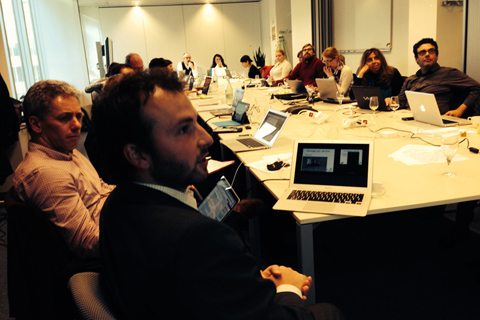Europeana Space launches its innovation mission

In the newly launched Europeana Space project, 29 partners are working together to explore the use and reuse of content available through Europeana. The project specifically focuses on creating new opportunities for jobs and economic growth.
By demonstrating different ways in which Europeana content can be exploited, the Europeana Space project aims to tackle current issues around copyright protection and tries to develop viable business models so that all Europeana content may live long and prosper.
Project Aims
Europeana Space looks specifically to generate revenue and return on investment. It aims to do so by moving the digital cultural resources surrounding Europeana to the exploitation phase. By building three spaces - a Technical Space, a Content Space and an Innovation Space - it connects economic actors and creates a Best Practice Network around Europeana to create value for the creative industries. The Spaces are both physical and virtual environments that enable the creative re-use of content.
Ultimately, the project results will land in Europeana Labs, the technical infrastructure that provides tools and resources to build applications based on Europe’s rich cultural resources.
Sound & Vision
During the project 6 pilots will be tested in the following thematic areas: Interactive TV, Dance, Photography, Publishing, Games and Museums. The Netherlands Institute for Sound & Vision leads the creation of the the EuropeanaTV Pilot. In it, we combine content from Open Images, Wikimedia Commons and Europeana to create an immersive TV experience for the user. The technical objective of the pilot is to enable a novel delivery method of Europeana content to SmartTV environments.
The pilot will support and evaluate two scenarios. The Broadcast Scenario, which has a wide reach of audience, will focus on social communities and has as topic the Fall of the Berlin Wall. The second scenario will focus on locality and personal memories. This Local Scenario has a smaller reach in audience, such as a living room or a classroom and target groups could be elderly people or students. The three content partners, Rundfunk Berlin-Brandenburg (RBB), Cinecittá Luce and Sound & Vision, will supply relevant content which can be used in both scenarios.
The Interactive TV pilot builds upon the work that has been done for other projects such as LinkedTV, EUscreen and HBB Next. The technology for the pilot will be built by Noterik, Proton-Labs and the National Technical University of Athens.
 Image: Taken at the WP4 pilots meeting in Brussels on 19th of March 2014. Source: Europeana Space Blog
Image: Taken at the WP4 pilots meeting in Brussels on 19th of March 2014. Source: Europeana Space Blog
During a pilots meeting in Brussels on the 19th and 20th of March all the pilot partners presented and discussed their ideas and methodology, laying the groundwork for some truly innovative and creative applications for the use of Europeana content. It will be interesting to see how the pilots will develop and ultimately pave the way for technological innovation and economic growth.
Hackathons
The project will be organising Hackathons and workshops to further map the market potential and support the construction of feasible business models. The Hackathon for the EuropeanaTV Pilot will take place in Amsterdam and will be organised together with Waag Society, a well-known research institution concerned with the social implications of technology. The outcomes of the Hackathon will then be used to create guidelines for monetising content and to select projects for further development
Link with Europeana Creative
Sound & Vision is also a key partner in the Europeana Creative project, which shares a similar aim: Developing exemplary applications that re-use Europeana content with the aim to inspire creative industries. Both projects will also make use of Europeana Labs, the technical playground for cultural heritage applications. To connect with creative industries, Europeana Creative organises various Challenge events, while the Europeana Space project will run a set of hackathons. Both activities are inspired by the pilots developed by the project partners.
In the Europeana Creative project, Sound & Vision oversees the development of pilots in 5 thematic areas and also leads the development of the Sound Connections Pilot. This pilot will ask communities to enrich geo-tagged sounds provided by Sound & Vision and the British Library with Europeana content and other sources on the web.
More Info
- Read more about Sound & Vision's part in Europeana Creative here.
- Europeana Space project website
- Europeana Creative project website
- The beta version of Europena's playground for remixing and using cultural and scientific heritage, Europeana Labs.
